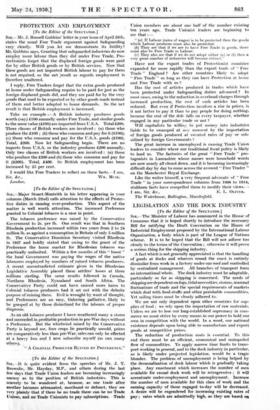PROTECTION AND EM?LOYMENT
[To the Editor of the SPEcrA.Toit.]
SIR,—Mr. J. Russell Gubbins' letter in your issue of April 26th, states the usual Free Trade argument against Safeguarding very clearly. Will you. let me demonstrate, its futility? Mr. Gubbins says, Granting that safeguarded industries do now employ more labour than they did under Free Trade, Pro- tectionists forget that the displaced foreign goods were paid for by other British goods or by British services. Now that these goods are not imported British labour to pay for them is not required, so the net result as regards employment is therefore unaltered.
I reply,' Free Traders forget that the extra goods produced at home under Safeguarding require to be paid for just as the foreign displaced goods did, and they are paid for by the very goods that used to be exported or by other goods made instead of them and better adapted to home demands. So the net result is that British employment is increased.
Take an example :—A British industry produces goods worth (say) £100 annually under Free Trade, and similar goods to the same value (1100) arc imported from U.S.A. Total £200. Three classes of British workers are involved : (a) those who produce the 1100 ; (b) those who consume and pay for it (1100); (c) those who consume and pay for the U.S.A. goods (1100). Total, 1300. . Now let Safeguarding begin. There are no imports from U.S.A. so the industry produces £200 annually. Only two classes of British workers are involved : (a) those who produce the £200 and (b) those who consume and pay for it (1200). Total, £400. So British employment has been increased by 25 per cent.
I would like Free Traders to reflect on these facts.—I am,






































 Previous page
Previous page